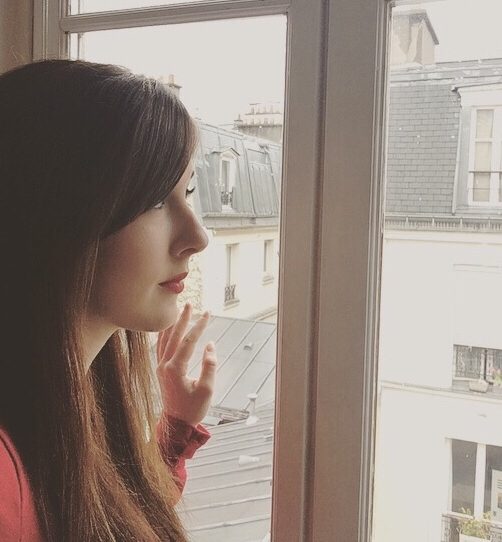As you are quite likely aware, this blog is called Adventures of an Anglaise — “anglaise” being the French word for English girl/woman. But in truth, I’m actually half “anglaise” and half “irlandaise”, and although I’ve never lived in Ireland, I’ve always identified very closely with that side of my nationality/heritage. It’s not particularly surprising, given the frequent trips to Ireland as a child; the fact that my formative years were spent predominantly in the care of my Irish parent; and the loving persistence of certain members of my Irish family in reminding me of those roots (largely through the medium of green/shamrock-bedecked gifts and beautiful books retelling Irish myths and legends). Although I’ve spent regrettably little time in the country as I’ve grown older, on the occasions I have made it back, I’ve experienced an overwhelming sense of homecoming; on my most recent trip, earlier this year, the emotion brought me to actual tears as I walked into Arrivals in Dublin Airport. To me, Ireland has always been, and will always be, home, in a way that’s difficult to define but no less meaningful for that.
I’ve gotten much better at articulating this sentiment over the last couple of years. When challenged on it in the past (particularly irately by one stubborn ex-boyfriend), I struggled to defend how I could have these feelings about a country and a people I’d spent my life apart from. Now I’m confident enough in myself to own who I am and how I feel about it, and I’ve realised nobody else’s opinion matters a jot. But suffice to say, identity has always been something of a complex concept for me, and it’s only become more so since I emigrated from my country of birth.
Shortly after I moved to Paris, I read an article that said once you’ve lived in another country for six months, you’ll never truly belong in any one place again. Obviously, you’ll always have a certain “otherness” in your adopted country — no matter how long you live somewhere, if you didn’t grow up there, there’ll always be formative experiences you didn’t have, significant moments you weren’t there for, cultural references you miss. And that’s before we even get to language barriers. But once you’ve left it, you’ll also never view your home country through the same lens again. And possibly your native “countrymen” won’t look at you in the same way either — the weight of your opinion on national current affairs and politics diminishes the longer you’re gone, for one thing. You lose your knowledge of the standard price of a pub pint, for another. I don’t know if six months is truly the benchmark (I’d be inclined to suggest it’s closer to a year), but I wholeheartedly agree with the principle.
As an expat, I’ve found (through personal experience and talking to others) that, in general, your sense of national identity changes gradually over time. However, I’ve discovered that some things can accelerate that change, causing a sudden shift; for me, the Covid-19 pandemic has been one such thing, unexpectedly leaving me with a greater sense of belonging to France than ever before.
I’d experienced a similar sentiment a couple of times over the two years prior, when we — in my mind, I am increasingly using the collective “we” with reference to the French — had encountered adversity as a country: the drama with the gilets jaunes (yellow vests) and the strikes either side of Christmas 2019 spring to mind. Along with all the other inhabitants of France, I experienced these challenging (/ inconvenient) situations that were exclusive to this country — so I suppose it’s natural that they would engender a certain sense of solidarity.
The same was true for positive events. Being in Paris when France won the 2018 football World Cup, it was impossible not to get swept up in the national euphoria. Not in the least because the day before the French team took the trophy, it was the Fête Nationale (aka Bastille Day). That weekend, I experienced a rare feeling of national pride, a surge of some sort of patriotism — but it wasn’t for my native country. It was strange and unfamiliar, but a nice feeling nonetheless.
And then along came the pandemic and amongst many other unexpected “side effects”, it changed and solidified that feeling in a way I couldn’t have anticipated. Life has been difficult for everyone throughout the bizarre, dystopian saga that the last couple of years have turned out to be, but the pandemic has been managed — and thus experienced — very differently in every country. So, the particular ways in which it’s been difficult in France are different to the ways in which it’s been difficult anywhere else. For me, that meant as the early confinement restrictions here got increasingly tighter, my sense of solidarity with the rest of the French population grew.
Meanwhile, the restrictions in place in my native country were implemented rather later than “ours” (in France) and were so much less stringent, that I couldn’t help but contrast my experience with that of the people I had left behind in England. Not, I want to emphasise, because I felt mine was so much worse — not at all. But it was undeniably very different, and I was reminded of this disparity daily by messages from friends and family who were following the situation in France on the news and kindly took care to check in with me, concerned and curious. Incidentally, I have never felt closer to many of my loved ones, and, cliché though it sounds, I was genuinely overwhelmed by the long-distance love and support I received throughout my two-month solo confinement, both from people I would normally speak to regularly, and people I hadn’t been in touch with in years. It did so much to keep the anticipated loneliness at bay and I was, and remain, immensely grateful. So I also want to highlight that this heightened feeling of belonging to France and, at the same time, distance from the UK, really has nothing to do with the individual people in my life.
It does, perhaps, have something to do with the British population at large, though. It’s not something I want to delve into at length on this blog — there’s a time and a place for some opinions to be aired — but suffice to say that, since the Brexit vote in 2016, I have become increasingly disillusioned with, and disappointed in the so-called leadership of my native country, and in the behaviour of too great a proportion of the people who belong to it. If I’m honest, there’s a lot about British culture that I have always struggled to identify with, or even understand — I think it’s a large part of why I was drawn to go elsewhere — but in the past couple of years, it’s felt like it’s just been one thing after another, to the extent that it’s now become a genuine point of embarrassment for me to admit to being British whilst living abroad.
That isn’t just a hang-up in my own head either; reactions to divulging information on my nationality to just about any other Europeans range from raised eyebrows and inhalations through gritted teeth (I hope you can picture the expression I’m trying to describe there), to actual (if not usually unkind) laughter. Some people just say “ah, Brexit!”, whilst others teasingly mention Boris Johnson. Although that said, a guy recently stopped me in the street to ask me out, and HIS response to my being English was “merci pour Pink Floyd”. Which made a very pleasant change. (Still didn’t give him my number though.)
It is jarring, uncomfortable and confusing to not feel at home in the only country in which you’ve ever lived — when your blood dictates you belong, but your heart insists you do not. Often putting it down to an age thing, or just general strangeness on my part, I didn’t really identify that it was an issue of culture until I immersed myself in another one, one that made so much more sense to me. And then it became quite quickly clear, and the day it did was perhaps the greatest lightbulb moment of my life. I wasn’t weird.* I was just in the wrong place.
Of course, there are ways in which I don’t fit in, in France; as I touched on already, as someone who was not born or raised here, or by French parents, I’ll always be marked by a certain “otherness”. But it’s okay, because it makes sense. My “otherness” is easily explicable. It’s normal, and inevitable, and actually a lot of it comes down to irrelevant surface details like my accent… and my luminously pale skin. What matters is, despite the differences, so much of French culture is such a perfect fit for my personality — my preferences, my priorities, my values, my outlook on life… my deep and abiding love of cheese. I’ve long since found a sense of belonging in Paris that I never felt anywhere else I called home.
It feels pretty damn good.
*Alright, maybe a bit weird. But for other reasons entirely.


Great post and |I get it completely. I struggled with the same after coming to UK but strangely enough, your Pops understood it. As an ex sea farer who ranged the world, he always called himself a citizen of the world.
LikeLiked by 1 person
Thanks, Thérèse. Glad it resonated with you. And I really enjoyed learning that Pops said that! Probably a topic for another blog post in its own right, but I’ve always found it funny how much significance (and ownership) we humans attribute to the bit of earth we happened to be born on.
LikeLike